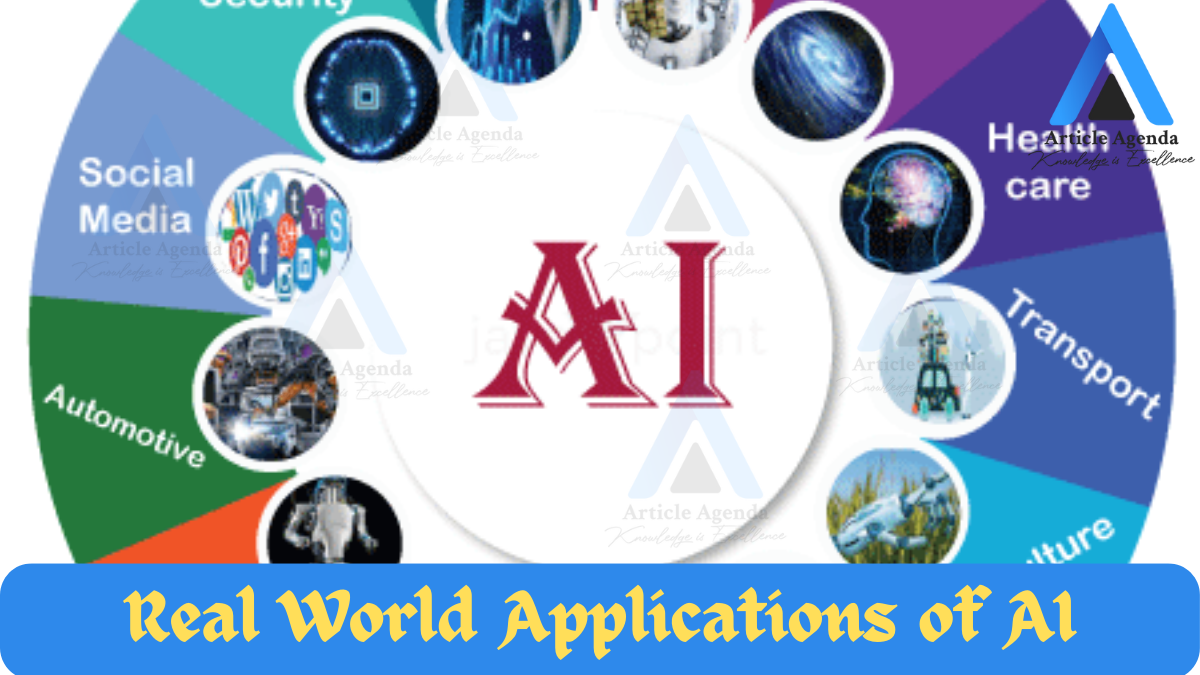Artificial Intelligence (AI) has become a transformative technology, revolutionizing various industries and sectors. As an experienced human writer, I’m excited to explore the real-world applications of AI and how it is shaping our future.
Table of Contents
- Introduction to AI and its real-world applications
- AI in healthcare
- AI in finance and banking
- AI in transportation and logistics
- AI in customer service and support
- AI in education
- AI in manufacturing and automation
- AI in agriculture
- AI in retail and e-commerce
- AI in cybersecurity
- AI in entertainment and gaming
- Future prospects and challenges of AI
- Conclusion Applications of AI
Introduction to AI and its real-world applications
Artificial Intelligence is the field of computer science that focuses on developing systems and algorithms that can perform tasks and solve problems in a way that mimics human intelligence. From virtual assistants to self-driving cars, AI has permeated our daily lives, offering solutions to complex challenges and improving our overall quality of life.
In this article, we’ll delve into the diverse applications of AI across various industries, showcasing how this technology is driving innovation and transforming the way we live and work. We’ll also discuss the future prospects and challenges of AI, providing insights into the exciting possibilities and the ethical considerations that come with this powerful technology.
Read More: Real Life Examples of Artificial Intelligence
AI in healthcare
One of the most impactful applications of AI is in the healthcare industry. AI-powered systems are revolutionizing the way we approach medical diagnosis, treatment, and patient care.
- Predictive Analytics: AI algorithms can analyze vast amounts of patient data, including medical records, genomic information, and diagnostic imaging, to identify patterns and predict the onset of diseases. This enables early intervention and personalized treatment plans, leading to improved patient outcomes.
- Automated Diagnosis: AI-powered tools can assist healthcare professionals in analyzing medical images, such as X-rays, CT scans, and MRI scans, to detect abnormalities and provide accurate diagnoses more efficiently than human experts.
- Precision Medicine: AI is enabling the development of personalized treatments tailored to an individual’s genetic profile, medical history, and unique characteristics. This approach helps to optimize treatment effectiveness and minimize adverse side effects.
- Virtual Assistants: Conversational AI chatbots and virtual assistants are being used to provide patients with 24/7 access to medical information, schedule appointments, and even assist with mental health support.
Read More: AI in Action: 14 Real-World Examples of How Industries Are Embracing Technology in 2024
AI in finance and banking
The finance and banking sectors have been quick to adopt AI technologies to streamline operations, enhance decision-making, and improve customer experiences.
- Fraud Detection: AI algorithms can analyze transaction patterns and behavior to identify suspicious activities, enabling banks to detect and prevent fraudulent transactions in real-time.
- Personalized Wealth Management: AI-powered robo-advisors can provide personalized investment recommendations and portfolio management services, catering to the unique financial goals and risk profiles of individual clients.
- Credit Risk Assessment: AI models can analyze a vast amount of data, including credit history, income, and spending patterns, to assess the creditworthiness of individuals and businesses, improving the accuracy of lending decisions.
- Algorithmic Trading: AI-driven trading systems can analyze market data, identify patterns, and execute trades at lightning-fast speeds, potentially outperforming human traders in certain market conditions.
Read More: 18 Cutting-Edge Artificial Intelligence Applications in 2024
AI in transportation and logistics
The transportation and logistics industries have embraced AI to optimize operations, improve efficiency, and enhance the customer experience.
- Autonomous Vehicles: Self-driving cars, trucks, and drones are being developed using AI-powered perception, decision-making, and control systems, promising to revolutionize the way we move people and goods.
- Route Optimization: AI algorithms can analyze real-time traffic data, weather conditions, and other factors to plan the most efficient routes, reducing travel time, fuel consumption, and environmental impact.
- Supply Chain Management: AI-powered systems can forecast demand, optimize inventory levels, and automate warehouse operations, leading to increased efficiency and reduced costs throughout the supply chain.
- Predictive Maintenance: AI can analyze sensor data from vehicles and infrastructure to predict when maintenance is required, enabling proactive repairs and reducing downtime.
Read More: The Rise of AI in Healthcare Applications
AI in customer service and support
AI has become a valuable tool in enhancing customer service and support, providing efficient and personalized experiences.
- Chatbots and Virtual Assistants: Conversational AI chatbots and virtual assistants can handle a wide range of customer inquiries, from product information to order status updates, providing 24/7 support and freeing up human agents to focus on more complex tasks.
- Sentiment Analysis: AI-powered sentiment analysis can help companies understand the emotional state of their customers, enabling them to provide more empathetic and tailored support.
- Predictive Analytics: AI can analyze customer data to anticipate their needs and proactively offer solutions, improving customer satisfaction and loyalty.
- Automated Ticket Handling: AI-driven systems can automatically categorize, prioritize, and route customer support tickets to the appropriate teams, streamlining the resolution process.
Read More: The Potential for Artificial Intelligence in Healthcare
AI in education
The education sector is embracing AI to personalize learning, enhance teaching methods, and improve student outcomes.
- Adaptive Learning: AI-powered adaptive learning platforms can create personalized lesson plans and learning paths based on each student’s strengths, weaknesses, and learning preferences, enabling more effective and engaging educational experiences.
- Intelligent Tutoring Systems: AI-driven tutoring systems can provide real-time feedback, answer questions, and offer targeted guidance to students, complementing the role of human teachers.
- Automated Grading: AI algorithms can assist educators in grading assignments and assessments, freeing up their time to focus on lesson planning and one-on-one interactions with students.
- Predictive Analytics: AI can analyze student data, such as attendance, engagement, and performance, to identify at-risk students and provide early intervention, helping to improve overall academic success.
Read More: What is the Difference Between Generative AI and GAN?
AI in manufacturing and automation
AI is transforming the manufacturing industry, driving increased efficiency, quality, and safety.
- Predictive Maintenance: AI-powered systems can analyze sensor data from manufacturing equipment to predict when maintenance is required, reducing downtime and improving overall equipment effectiveness.
- Quality Assurance: AI-powered computer vision systems can inspect products for defects and inconsistencies, improving quality control and reducing the need for manual inspections.
- Robotic Process Automation: AI-enabled robotic systems can automate repetitive tasks, such as assembly, packaging, and material handling, improving productivity and reducing the risk of human error.
- Supply Chain Optimization: AI can analyze supply chain data, including demand forecasts, inventory levels, and logistics, to optimize production planning, inventory management, and distribution, leading to cost savings and improved responsiveness.
Read More: What is generative AI? How does it work?
AI in agriculture
AI is revolutionizing the agricultural industry, helping farmers and agronomists make more informed decisions and improve overall productivity.
- Precision Farming: AI-powered sensors and drones can collect data on soil conditions, weather patterns, and crop health, enabling farmers to make data-driven decisions on irrigation, fertilization, and pest management.
- Yield Prediction: AI algorithms can analyze historical data, weather forecasts, and satellite imagery to predict crop yields, allowing farmers to plan their operations more effectively.
- Autonomous Farming: Self-driving tractors and other farm equipment, powered by AI, can perform tasks such as plowing, seeding, and harvesting with increased efficiency and precision.
- Disease and Pest Detection: AI-based computer vision systems can identify signs of disease or pest infestations in crops, enabling early intervention and reducing the risk of crop loss.
Read More: What is Generative AI and How Does it Impact Businesses?
AI in retail and e-commerce
Retail and e-commerce businesses are leveraging AI to enhance the customer experience, optimize operations, and drive sales.
- Personalized Recommendations: AI-powered recommendation engines can analyze customer browsing and purchase history to suggest products and services that are tailored to their individual preferences and interests.
- Demand Forecasting: AI algorithms can process data from various sources, including sales trends, weather patterns, and social media, to accurately predict customer demand and optimize inventory levels.
- Automated Pricing: AI-driven dynamic pricing models can adjust product prices in real-time based on factors such as competition, seasonality, and customer behavior, maximizing profitability.
- Conversational Commerce: AI-powered chatbots and virtual assistants can engage with customers, answer questions, and assist with product selection and purchase, providing a seamless and personalized shopping experience.
Read More: Google Generative AI
AI in cybersecurity
AI is playing a crucial role in enhancing cybersecurity, helping organizations detect, prevent, and respond to cyber threats.
- Anomaly Detection: AI algorithms can analyze network traffic and user behavior to identify anomalies that may indicate a security breach, allowing for faster detection and response.
- Automated Threat Hunting: AI-powered systems can continuously scan for and identify potential threats, proactively hunting for malicious activities and reducing the risk of successful cyber attacks.
- Vulnerability Identification: AI can be used to scan systems and applications for vulnerabilities, prioritizing the most critical issues and enabling timely patching and remediation.
- Automated Incident Response: AI-driven security orchestration and automated response (SOAR) systems can quickly analyze security incidents, determine the appropriate course of action, and initiate response procedures, minimizing the impact of cyber attacks.
Read More: Which career is better, AI and CS?
AI in entertainment and gaming
The entertainment and gaming industries have embraced AI to create more immersive and engaging experiences for users.
- Content Generation: AI can be used to generate personalized content, such as music, scripts, and game levels, tailored to individual preferences and interests.
- Intelligent Non-Player Characters (NPCs): AI-powered NPCs in video games can exhibit more realistic and dynamic behaviors, making gameplay more challenging and lifelike.
- Predictive Recommendations: AI-based recommendation systems can suggest movies, TV shows, and games based on a user’s viewing history and preferences, enhancing the overall entertainment experience.
- Virtual Assistants: AI-powered virtual assistants can provide personalized recommendations, answer questions, and even engage in natural conversations with users, enhancing the interactive experience.
Read More: Exploring the Role of Computer Engineers in Artificial Intelligence Development
Future prospects and challenges of AI
As AI continues to evolve, we can expect to see even more remarkable advancements and applications in the years to come. However, the rapid growth of AI also brings about significant challenges that must be addressed.
- Ethical Considerations: The increasing use of AI raises important ethical questions, such as privacy, bias, and the impact on employment. Responsible development and deployment of AI will be crucial to ensure it benefits humanity as a whole.
- Explainability and Transparency: As AI systems become more complex, it is essential to develop techniques that can explain the decision-making process and ensure transparency, enabling trust and accountability.
- Data Privacy and Security: The large-scale collection and processing of data by AI systems heighten the need for robust data privacy and security measures to protect sensitive information.
- Workforce Adaptation: The automation of tasks and jobs by AI will require a significant shift in the workforce, necessitating the development of new skills and the implementation of effective retraining programs.
Read More: Mastering AI: A Domain of Computer Science or Electrical Engineering?
Conclusion Applications of AI
Artificial Intelligence has undoubtedly transformed various industries and sectors, offering innovative solutions to complex problems. From healthcare to entertainment, AI is shaping our world in remarkable ways, improving efficiency, enhancing decision-making, and providing personalized experiences.
As we continue to explore the vast potential of AI, it is crucial to address the ethical, security, and societal challenges that come with this transformative technology. By striking a balance between innovation and responsible development, we can harness the power of AI to create a better future for all. To stay informed about the latest advancements in AI and how they can benefit your business or personal life, subscribe to our newsletter. Our experts will provide you with valuable insights and practical tips on leveraging AI to drive innovation and success
Latest Post:
-
What is Leonardo AI? Definition, Features & How to Use
Artificial intelligence has revolutionized the way we approach problem-solving, data analysis, and automation. One such cutting-edge tool in this domain is Leonardo AI, a versatile platform designed to assist in a variety of computational tasks. This article delves into the intricacies of Leonardo AI, exploring its definition, features, and practical applications. By the end, you’ll…
-
Leonardo AI: AI Image Generator
Introduction to Leonardo AI As an experienced human writer, I’m excited to share with you the power of Leonardo AI, an innovative AI image generation tool that is revolutionizing the way we create and interact with visual content. In this comprehensive article, we’ll dive deep into the world of Leonardo AI, exploring its capabilities, advantages,…
-
Working as a Freelancer in 2024: Your Guide
Introduction to Freelancing As we approach the year 2024, the world of work is undergoing a profound transformation. Freelancing, once a niche pursuit, has now become a mainstream career path for millions of individuals worldwide. In this comprehensive guide, we will explore the ins and outs of working as a freelancer in 2024, examining the…





Hey people!!!!!
Good mood and good luck to everyone!!!!!
Your blog has quickly become my go-to source for reliable information and thought-provoking commentary. I’m constantly recommending it to friends and colleagues. Keep up the excellent work!
Hey people!!!!!
Good mood and good luck to everyone!!!!!
A beloved National Park Service ranger died when he tripped, fell and struck his head on a rock during an annual astronomy festival in southwestern Utah, park officials said over the weekend.
[url=https://kraken13.at-kraken14.at]kraken14.at[/url]
Tom Lorig was 78 when he died after the incident at Bryce Canyon National Park late Friday.
kraken14.at
https://krakena17.at
He was known for his extensive work as a ranger and volunteer at 14 National Park Service sites, including Yosemite National Park, Carlsbad Caverns National Park and Dinosaur National Monument, the park service said in a statement Saturday.
“Tom Lorig served Bryce Canyon, the National Park Service, and the public as an interpretive park ranger, forging connections between the world and these special places that he loved,” Bryce Canyon Superintendent Jim Ireland said in the statement.
Hey people!!!!!
Good mood and good luck to everyone!!!!!
casino
Your blog is a treasure trove of valuable insights and thought-provoking commentary. Your dedication to your craft is evident in every word you write. Keep up the fantastic work!
visit [url=https://keplr.me]keplr wallet download[/url]